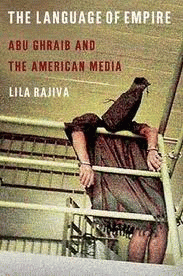Book Review
The Language of Empire is an examination of the Abu Ghraib scandal, from the perspective that the US military's use of torture was primarily an instrument of terror (i.e. a military tactic intended to cause intimidation). In addition to outlining what actually happened at Abu Ghraib, Rajiva also looks at the Senate Armed Services Committee investigation triggered when the scandal first broke in April 2004. However most of book concerns the media coverage of Abu Ghraib and what it tells us about the highly sophisticated psychological strategies employed by Pentagon and Wall Street propagandists.
The book starts off with a detailed catalog of the different forms of torture employed against prisoners (who were for the most part civilian non-combatants) at Abu Ghraib, with particular emphasis on the rape of female prisoners (only reported by the Christian Science Monitor) and the sodomizing of Iraqi teenagers, both largely ignored by the mainstream media. The third chapter is devoted to the Senate investigation, which in Rajiva's view was a whitewash allowing the Republican majority to scapegoat a few "bad apples" -- rather than investigate Secretary of Defense Donald Rumsfeld and four of his deputies, who had clearly mandated the use of torture in interrogations. Rajiva is also critical of Senate Democrats, who focused entirely on the legal paper trail and the Pentagon's failure to keep Congress informed, rather than a diseased Pentagon culture that enabled the US to adopt torture as official policy.
Rumsfeld's Corporatization of the Pentagon
She goes on to describe Rumsfeld's wholesale "corporatization" of defense -- citing his misguided cost-cutting (resulting in dangerously low troop levels and shortages in armored jeeps and other protective equipment) and his consolidation of all Middle East intelligence and propaganda functions under the Pentagon. Far more politically significant, however, was his move to contract with private companies to perm major military and intelligence functions. This, in turn, introduced the secrecy of the corporate boardroom into military operations, while simultaneously transferring major policy decisions from military professionals to civilians. As Rajiva points out, civilian leaders have also been far more eager than generals (she gives the example of Eisenhower and MacCarthur opposing the nuking of Japan) to employ weapons of terror.
The US War Of Terror
Having laid down this context, Rajiva proceeds to discuss the media coverage and propaganda function of what she, like many international and progressive analysts view as a US war of terror -- the deliberate use of force to intimidate foreign and domestic opponents -- rather than a war on or against terror. She devotes an entire chapter to the kidnapping and beheading of Nicholas Berg, which coincidentally took place the same week the torture scandal broke and pre-empted coverage of Abu Ghraib for 24 hours. The Nick Berg melodrama also served as a focus for right wing media attacks on what they claimed was excessive coverage of the torture of Muslim terrorists in contrast to the slaughter of "innocent" civilian Nick Berg. Rajiva, like many progressive bloggers, disputes Berg's alleged "innocence." Like 9/11, Berg's kidnapping resulted in numerous unanswered questions, with his detention by the US military the week before his kidnapping and his apparent links to one of the 9/11 hijackers and to the intelligence community (US, Iranian and/or Israeli -- take your pick).
The Psychology of Terrorism
Although she deals briefly with the cultural use of forced nakedness, sexuality and homosexual role play, compounded by the global distribution of photos of Muslim men humiliated in this way, most of this section deals with the intended psyops function of Abu Ghraib coverage on the American public. I found this to be the most valuable part of the book, as it provides a detailed analysis of the psychological underpinnings of America's complex government and corporate propaganda systems.
Rajiva explores two broad themes in analyzing the psychological effects of a sophisticated propaganda network in which Wall Street, the Pentagon and US intelligence play overlapping roles. The first relates to deliberately orchestrating fear and confusion in the American public to increase their susceptibility to ideological propaganda. The second relates to the deliberate use of fragmented, highly emotive images and scenarios in the absence of historical or logical context.
Deliberately Orchestrating Fear and Confusion
For most Americans, according to Rajiva, the new millennium has seen the replacement of normal social interaction with incoherent economic and biological drives reinforced by continual advertising messages to consume. In this virtual reality, where 40% of Americans can't locate Iraq (or France) on a map, this makes them exquisitely vulnerable to manipulation by Pentagon ideological messaging. Layered on top of this are the red state/blue state "culture wars," which Rajiva believes are a deliberate government/corporate strategy to confuse the US public over the real battle in every state: the conflict between corporate interests and their artificial mass culture and the real needs of people and their communities. She also highlights the role of the corporate media in heightening the insecurity of white males over increasing competition from women and minorities and declining white birth rates -- and effectively projecting these internal fears on an external enemy (Islam).
(Note: You can view every article as one long page if you sign up as an Advocate Member, or higher).






